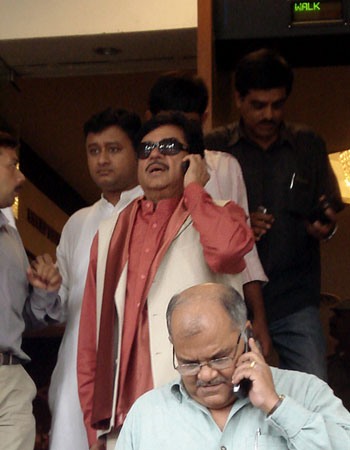
Hawa hai garam, par is mausam ka bhi aalam badlega (The air is warm, but this season will also change).
It is 38 degrees but seems like 45 and former film star-turned-politician Shatrughan Sinha feels the winds of change are just round the corner -- not only for the nation, but for Bihar.
Once one of India's best administered states, the land of Chandragupta Maurya and Ashoka, Bihar is often ridiculed and reviled as the sick man of India.
"At one point it looked that Bihar could not go down any further, that no change could happen here, but today the state has taken a U-turn under Nitish Kumar. Bihar was lacking because of poor leadership and vested interests -- that period is behind us," Sinha, who opposed Nitish Kumar's candidature as chief minister in 2005, tells rediff.com before setting out for campaigning from the Maurya Hotel in the heart of Patna.
"Instead of criticising it in cocktail parties if we come together and work, I am sure that day is not far when we can restore Bihari pride."
It is perhaps with this in mind that Sinha, who has been using his famous super-short dialogue Khamosh at every meeting, spells out his agenda in four short words:
"Peace. Prosperity. Progress. Pride. My agenda is based on four Ps," he says with a flourish in his signature movie star booming voice.
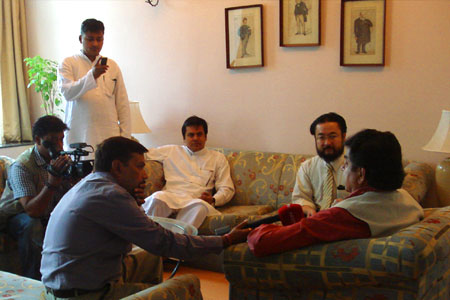
Although it has been 20 years since he joined the Bharatiya Janata Party and saw box office successes like Kala Patthar, Kalicharan and Dostana, 'Shotgun' (Stardust magazine's endearing description of his speak-first-think-later manner) Sinha's style still remains a part of his personality. One that he has been making full use of during his campaigns to strike a chord with the voters of the city he grew up in.
"I have struggled in my professional, social and political life to reach where I am," he says and asserts that he is the first Indian film star to become a Union minister.
"My name is also included in The Limca Book of Records for that," he informs us. "I joined the BJP as a social obligation when the party only had 2 seats. People laughed at me at that time."
Sinha lists his film and political achievements at his campaign meetings -- especially so because his principal opponent, the Congress's Shekhar Suman, is a political greenhorn who only formally joined the party last month.
"I was the first actor from Bihar to become a film star. There was no one before me and till date no Bihari has attained the stardom I had. I worked hard in my film career as I did in my politics to become a Union minister twice," he tells young students at the Patel hostel who invite him to their small common room, where only the fan above Sinha whirs.
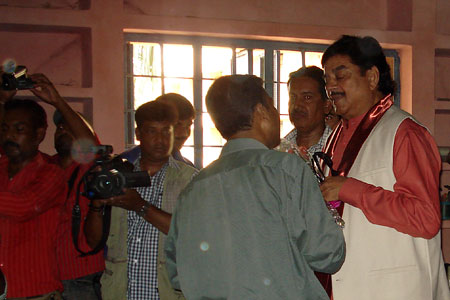
"I did not have any godfather and made it on my own, so if you have determination and perseverance you will succeed."
Sinha goes back in history to dig out his sources of inspiration -- Jawaharlal Nehru, whom he heard in rapt attention as a little boy; Jayprakash Narayan, the Bihari hero who stood up against Indira Gandhi in the mid 1970s and masterminded India's first non-Congress government whom the actor fell in love with; and Atal Bihari Vajpayee, in whose government he served.
"It is very important to dream because if you don't, how will you ever fulfill those dreams?" he says, attempting to fire up the boys who are studying to appear for various competitive exams.
The boys listen intently, giving no inkling of the salvo of uncomfortable questions that they have in their arsenal for the Bihari Babu.
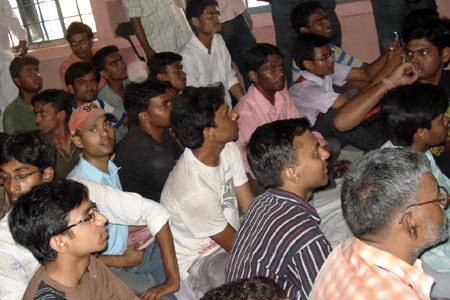
"Seeing all this, how could you still call Bal Thackeray your father figure?" asks another boy. "I go to the Kali temple every day on the banks of the Ganga and I often ask how could you bring yourself to call him that?"
"We come from very poor homes and have to pay Rs 1,500, Rs 2,000 as rent which is beyond our means. What are you going to do for us specifically?"
Sinha fields the questions in adept Hindi, calling Mumbai -- the city where he built his career and his home -- his karmbhoomi (source of livelihood) and Patna his janambhoomi (birthplace).
"Both have an equal importance in my life and I condemned the attacks. Why don't you ask the Congress candidate (Shekhar Suman) whose party is in power in Maharashtra? And what about that person (Lalu Yadav) who was going to perform Chhat Puja in Mumbai. Whatever happened to that?"
Sinha has had to respond to these questions time and again during the campaign. He explains to the young men sitting before him that he would still call Bal Thackeray a father figure.
"My values have taught me to respect anyone who is as old as my father like a father figure. I would accord that same respect to Iman Bukhari (the former Imam of Delhi's Jama Masjid) and to Jyoti Basu (the former West Bengal chief minister) -- they are also like my father," he clarifies, adding that he had met Bal Thackeray seeking his intervention to stop the attacks against north Indians by the Maharashtra Navnirman Sena, led by Thackeray's estranged nephew Raj Thackeray.
The boy, who asks about the high hostel fees, is not satisfied with Sinha's answer when the star begins reliving his experience as a struggler in Mumbai, sharing a room with six others for Rs 200 in the early 1970s.
"I want to know if you will do something for us," the boy says firmly to which Sinha replies that he has a plan for improving the education infrastructure if he were to voted to Parliament.
The boy seems far from convinced.
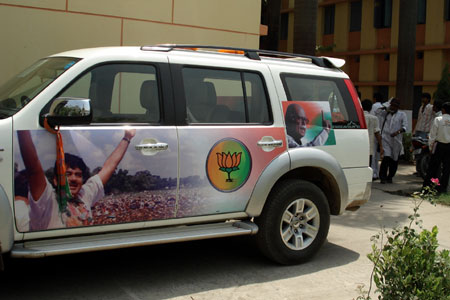
"I was given a commitment that I could fight from any seat in the country, that way I feel fortunate," he tells rediff.com
The Patna Saheb constituency has a large Kayastha population, the community that both Sinha and his Congress opponent Shekhar Suman belong to. "After Jayaprakash Narayan, I am the only one who cuts across party lines and is accepted by all," he says with typical bombast.
Yet, Sinha is not blind to the ground realities. "People in Bihar don't caste their vote, but vote their caste," he says about the stranglehold of caste that has defined Bihar politics over the years.
Of his opponent, whom Sinha never once refers to by his name, he says: "My relationship with him is very cordial, he is like a younger brother. I was told till the last minute he was trying for a BJP ticket. He was also seen at the swearing-in ceremony of Mr (Narendra) Modi. All of a sudden he calls us communal and becomes secular overnight. All I can say to him is best of luck, god bless."
Voters in Patna seem more excited about Shekhar Suman, the television star who inhabits their drawing rooms now rather than an actor seen only in 1970s movie re-runs. "He is on TV every night and is more popular," a city beautician says about Suman.
"At least Suman is fresh, he may do something for the city. Shatrughan Sinha was a Union minister, what did he do?" asks another city professional.
On the banks of the Ganga, in the city's maiden star versus star battle, the people's verdict on who is the bigger hero is just days away.